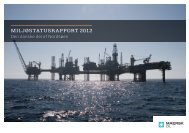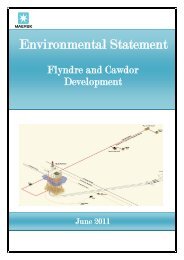Environmental Statement - Maersk Oil
Environmental Statement - Maersk Oil
Environmental Statement - Maersk Oil
Create successful ePaper yourself
Turn your PDF publications into a flip-book with our unique Google optimized e-Paper software.
Balloch Field Development <strong>Environmental</strong> <strong>Statement</strong><br />
Appendix A – Review of Legislation<br />
discharge amended 2011) (as amended by the<br />
Energy Act 2008 (Consequential<br />
Modifications) (Offshore <strong>Environmental</strong><br />
Protection) Order 2010)<br />
PON 15e<br />
Preliminary<br />
discussions<br />
Decommissioning<br />
proposals<br />
Petroleum Act 1998 (as amended by the<br />
Energy Act 2008 and in accordance with<br />
OSPAR Decision 98/3 )<br />
IMO Guidelines and Standards for the<br />
removal of offshore installations and<br />
structures on the continental shelf 1989<br />
DECC Guidance note for Industry<br />
Decommissioning of Offshore<br />
Installations and Pipelines 2009<br />
Under these Regulations, permits to use and discharge chemicals, including decommissioning chemicals, need to be<br />
obtained. Types of permit required for the operations would be a PON15e for use and discharges of chemicals during<br />
decommissioning. The permits are applied for using the application form found at<br />
https://www.og.decc.gov.uk/regulation/pons/index.htm and emailed to the <strong>Environmental</strong> Management Team at DECC.<br />
The application requires a description of the work carried out, a site specific environmental impact assessment and a list<br />
of all the chemicals intended for use and/or discharge, along with a risk assessment for the environmental effect of the<br />
discharge of chemicals into the sea. The permit obtained may include conditions.<br />
Permits now extend to operational and non‐operational emissions of chemicals under the 2011 amendments and to<br />
carbon sequestration activities under the Energy Act 2008 (Consequential Modifications) (Offshore <strong>Environmental</strong><br />
Protection) Order 2010.<br />
Regulator: DECC<br />
OSPAR Decision 98/3 concerns the decommissioning of installations. It requires that decommissioning will normally<br />
remove the whole of an installation, although there are some exceptions for large structures. However, currently, there<br />
are no international guidelines for the decommissioning of pipelines.<br />
Under the terms of the OSPAR Decision 98/3 there is a prohibition on dumping and leaving wholly or partly, in place of<br />
offshore installations. All installations installed post 1999 should be removed entirely. For those installed pre 1999 the<br />
topsides must be returned to shore and all installations with a jacket weight of less than 10,000 tonnes completely<br />
removed for re‐use, recycling or final disposal on land with installations of greater than 10,000 tonnes being considered<br />
on an individual basis with the base case being that they will be removed entirely.<br />
The Petroleum Act 1998 sets out requirements for undertaking decommissioning of offshore installations and pipelines<br />
including preparation and submission of a Decommissioning Programme. Decommissioning proposals for pipelines<br />
should be contained with a separate Decommissioning Programme from that of installations. However, programmes for<br />
both pipelines and installations in the same field may be submitted in one document.<br />
Part III of the Energy Act 2008 amends Part 4 of the Petroleum Act 1998 and contains provisions to enable the Secretary<br />
of State to make all relevant parties liable for the decommissioning of an installation or pipeline; provide powers to<br />
require decommissioning security at any time during the life of the installation and powers to protect the funds put aside<br />
for decommissioning in case of insolvency of the relevant party.<br />
The Petroleum Act 1998 as amended stipulated that a decommissioning programme needs to be prepared and agreed<br />
with DECC.<br />
The main stages of the decommissioning process are:<br />
Stage 1 ‐ Preliminary discussions with DECC<br />
A ‐ 29








